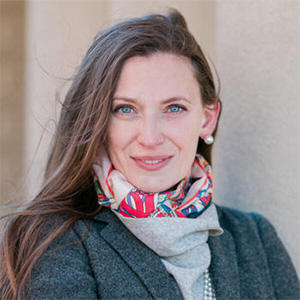In This Story
We all wear multiple hats. There’s our workplace identity, which can often be defined by our job title or our position on an org chart. At home, we are someone else—a mother, father, sports fan, etc. And with family and friends, we may take on yet another identity—caregiver, or perhaps mediator. When we face a big change to any one of these identities, whether professional or personal, we tend to feel out of control and disjointed. Sarah Wittman, assistant professor of management and of industrial-organizational psychology (by courtesy), studies the power of narratives in steadying us during these uncertain moments.

“Narration isn’t necessarily to an audience, it can be for yourself,” Wittman says. “It’s that sense-making of ‘how do I understand the world, how do I understand my different pieces fitting together?’” Her research explores how self-crafted narratives can provide a holistic sense of our multiple identities and of our past, present and future experiences coming together. Organizations should care about this if they want to help their employees find coherence within role transitions.
For example, Wittman’s paper in Academy of Management Review—co-authored by Blake Ashforth of Arizona State University and Herminia Ibarra of London Business School—describes two key beneficial outcomes of narrative sense-making: static and dynamic holism.
Static holism comes from a “snapshot” or moment in time wherein we form a consistent sense of self that merges various identities. This might occur, for example, when a person unifies their personal and professional identities under a larger umbrella. Someone who often advocates for colleagues at work while also volunteering for political campaigns might achieve static holism by thinking of herself as a “change agent”—a label that bridges the two.
Dynamic holism emerges from narrating our lives across time, multiple roles, and identities. For example, a newly promoted business administrator could derive strength from recalling their previous career transitions and moving between different roles to prepare them for this moment of uncertainty.
Wittman's research shows that holism, especially dynamic holism, benefits individuals through authenticity, wisdom, adaptiveness, and resilience. Authenticity can result in a truer sense of self. Wisdom helps individuals work through ongoing changes by fostering reflection. The adaptiveness that comes from being open to opportunities they otherwise wouldn't have considered makes an individual more open-minded and flexible. Lastly, resilience draws from multiple diverse identities to better process challenges and disruptions.
Using herself as an example, Wittman says, “As a child, I had a collection of over 200 vintage hats. Now I no longer collect hats, but I’m still the same: authentically me. If you look over time, all the strands start weaving together. From collecting hats, I started exploring the cultures that use hats, France in particular, and I started learning French; this cultural and linguistic knowledge allowed me to better adapt when I ended up there doing my PhD…. This narrative shows how it’s OK to change, but how even in change, there is continuity. The hat collector evolves into something else.”
However, Wittman believes most workplaces overlook the whole of a person. “For organizations and for research, what is concerning to me is that we often look at people as if they were replicable,” she says. “That they can be segmented and treated or studied as ‘just’ a person in a workplace. We miss the idiosyncrasies across people’s multiple identities and over their life spans that make each worker uniquely human.”
She argues that it is mostly a bandwidth problem (managers have a lot on their plates).Still, not taking into account who employees are outside of their work functions and their professional identities can influence how they show up to work, and how much they can ultimately put into their work.
This means not only that individuals lose out on the aforementioned benefits of more holistic self-narratives, but also that organizations are prone to damaging misunderstandings about their employees.
“Even if they have the same degree, even if they have the same positions as they’re growing in an organization, without understanding all of that backstory and messiness and all of this other stuff, you have no clue whether they’re going to stay in the company and progress or whether they’re looking to hop jobs,” Wittman says.
In addition to more accurate business analyses, organizations that help employees develop tools for narration benefit from fostering mutual trust.
“That’s what I think is the beauty of it. It makes a first step in starting to look at the whole human and say that the whole human matters,” Wittman says. “We’re all telling stories about how we somehow hang together across all of these points in time and across all of this mess of our lives. Somehow we have to muddle through, and narratives help us to make sense of it to ourselves and other people.”
